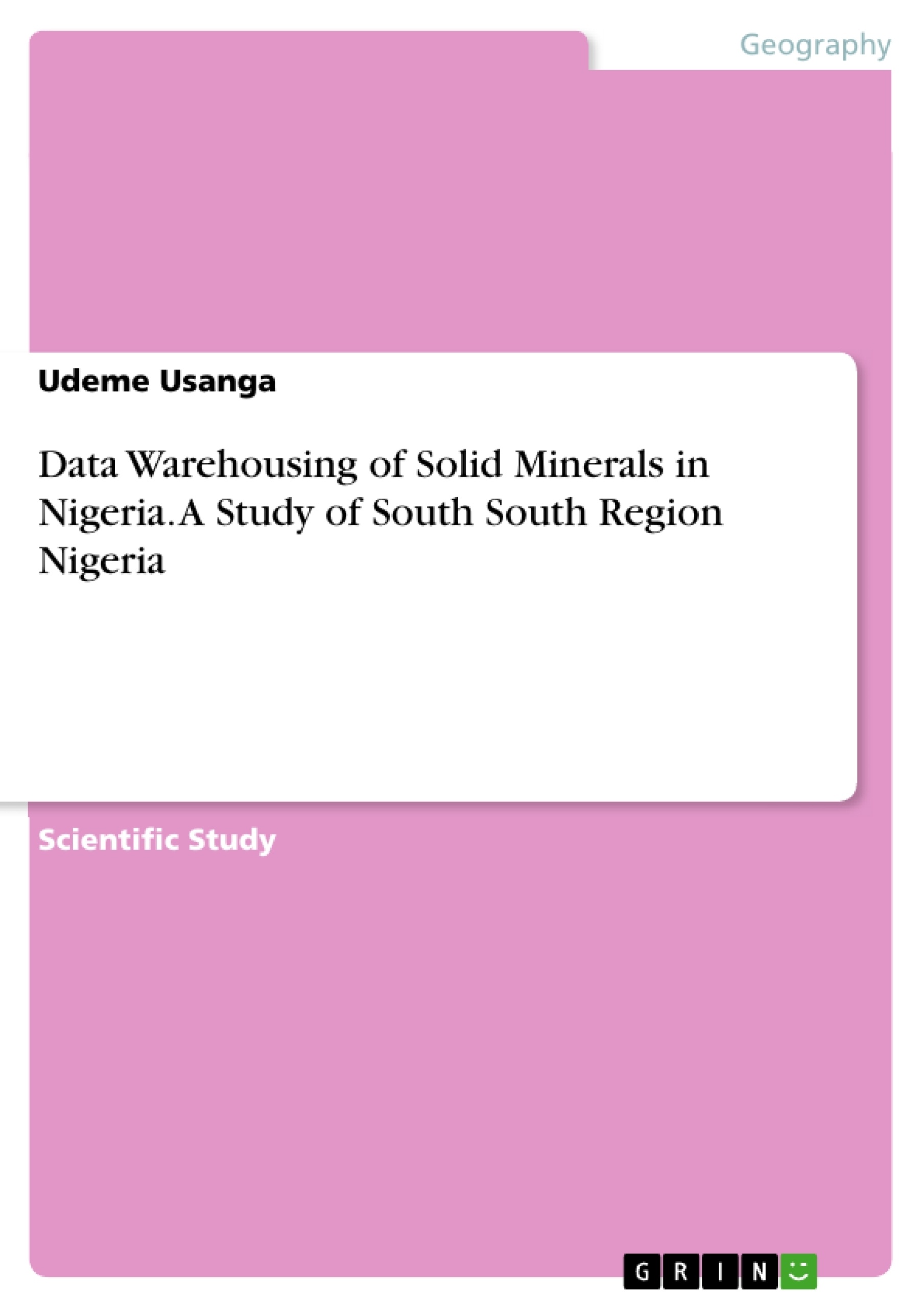In recent years, decision support systems otherwise called Data Warehouse have become an integral part of organization's decision-making strategy. Organizations these days are competing in the global market. In order for any organization to gain competitive advantage over the others and also to help make better decisions, Data warehousing cum Data Mining are now playing a significant role in strategic decision making, nationally and globally. It helps in better decisions, streamline work-flows, and provide better customer services.
This paper gives the report about developing data warehouse for solid minerals in Nigeria, using a model of management system as a case study to capture solid minerals in the South South Region of Nigeria. It describes the process of data warehouse design and development using Microsoft SQL Server Analysis Services. It also outlines the development of a data cube as well as application of Online Analytical processing (OLAP) tools and Data mining tools in data analysis. It was concluded that the effective use of Data-Warehousing and Data mining in solid minerals resource management system will promote the rapid growth of the Nigerian diverse mineral resources and offer information on past, present and future prospects of mineral deposits, for exploration and utilization for economic development.
Inhaltsverzeichnis (Table of Contents)
- Introduction
- Nigeria's Solid Minerals Sector
- Mineral Resources Classification
- The South South Region
- Solid Minerals in South Southern Nigeria
- Geosciences
- System Analysis and Research Methods
- Functional requirements
- Nonfunctional requirements
- Data Warehouse
Zielsetzung und Themenschwerpunkte (Objectives and Key Themes)
This paper presents a case study on developing a data warehouse for solid minerals in Nigeria, focusing on the South South Region. The objective is to investigate the potential of data warehousing and data mining techniques for enhancing decision-making processes in the solid mineral sector. The study employs Microsoft SQL Server Analysis Services to design and develop the data warehouse, integrating Online Analytical Processing (OLAP) and data mining tools for data analysis.
- The importance of data warehousing in strategic decision-making for organizations.
- The potential of data warehousing and data mining for promoting the growth of Nigeria's economy.
- The challenges faced by the solid minerals sector in Nigeria, including lack of reliable data and infrastructure.
- The significance of the South South Region in terms of solid mineral resources.
- The role of geosciences in improving data collection and driving investment in the sector.
Zusammenfassung der Kapitel (Chapter Summaries)
- Introduction: This chapter provides a brief overview of Nigeria's geographical context, highlighting the country's geology and the dominance of three major rock types. It also sets the stage for the study by emphasizing the importance of data warehousing in strategic decision-making.
- Nigeria's Solid Minerals Sector: This chapter delves into the economic landscape of Nigeria, highlighting the importance of the oil and gas sector and the need to diversify the economy. It then focuses on the solid minerals sector, discussing its historical contribution to the GDP and the challenges it faces, including the lack of data, illegal mining, and infrastructure limitations.
- Mineral Resources Classification: This chapter presents a classification of mineral resources, categorizing them into metallic, non-metallic, and fuel mineral resources, and providing examples of each category.
- The South South Region: This chapter explores the South South Region, highlighting its rich reserves of solid minerals, including granite, barites, marble, and clay. It discusses the impact of the oil boom on the solid mineral sector, leading to neglect and illegal mining activities.
- Solid Minerals in South Southern Nigeria: This chapter provides a detailed list of the solid minerals found in each state of the South South Region, including Akwa Ibom, Bayelsa, Cross River, Delta, Edo, and Rivers.
- Geosciences: This chapter emphasizes the role of geosciences in improving the quality and availability of geological data, highlighting the importance of reliable data in attracting investment in the solid minerals sector.
- System Analysis and Research Methods: This chapter outlines the methodology employed in the study, focusing on the functional and nonfunctional requirements for the data warehouse prototype. It also describes the process of data gathering through interviews with stakeholders in the solid minerals sector.
- Data Warehouse: This chapter provides a comprehensive definition of data warehouses and their role in supporting decision-making. It highlights the benefits of data warehousing and Online Analytical Processing (OLAP) in improving data analysis and knowledge extraction.
Schlüsselwörter (Keywords)
This paper focuses on the development and application of data warehousing and data mining in the context of Nigeria's solid minerals sector, specifically in the South South Region. Key terms and concepts include data warehousing, data mining, decision support systems, Online Analytical Processing (OLAP), solid minerals, mineral resources, geological data, and economic diversification.
Frequently Asked Questions
What is the main goal of this study on Nigeria's solid minerals?
The goal is to develop a data warehouse and use data mining to support strategic decision-making in the solid minerals sector, specifically in the South South Region of Nigeria.
What technology was used to build the data warehouse?
The data warehouse was designed and developed using Microsoft SQL Server Analysis Services.
Why is the South South Region significant for solid minerals?
Despite the oil boom, this region has rich reserves of minerals like granite, barites, marble, and clay that have been neglected or mined illegally.
What is the role of Online Analytical Processing (OLAP) in this project?
OLAP tools are used for complex data analysis and knowledge extraction from the data cube to help mineral resource management.
What challenges does the Nigerian solid minerals sector face?
Key challenges include a lack of reliable geological data, illegal mining activities, and limited infrastructure.
How can geosciences help the Nigerian economy?
Geosciences improve the quality of geological data, which is vital for attracting investment and diversifying the economy away from oil and gas.
- Quote paper
- Udeme Usanga (Author), 2023, Data Warehousing of Solid Minerals in Nigeria. A Study of South South Region Nigeria, Munich, GRIN Verlag, https://www.hausarbeiten.de/document/1387590


